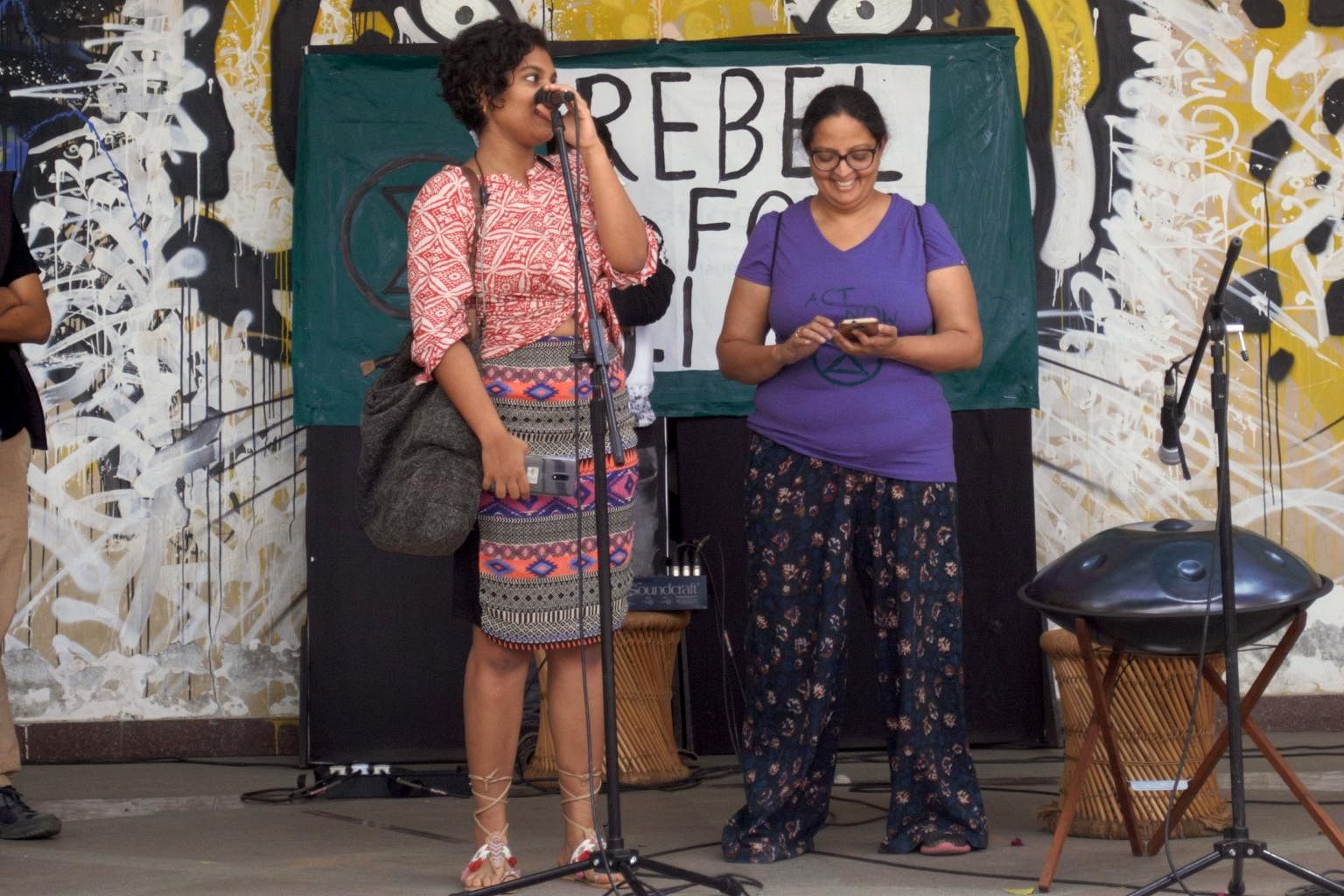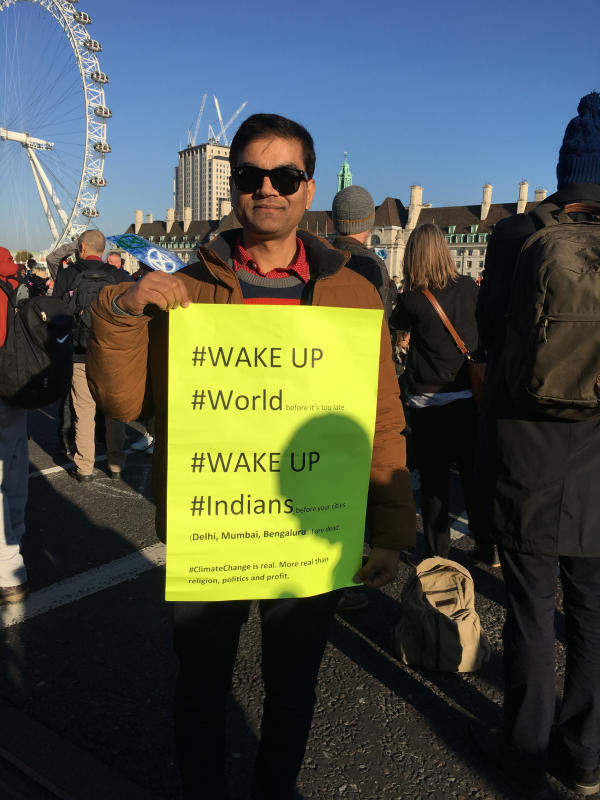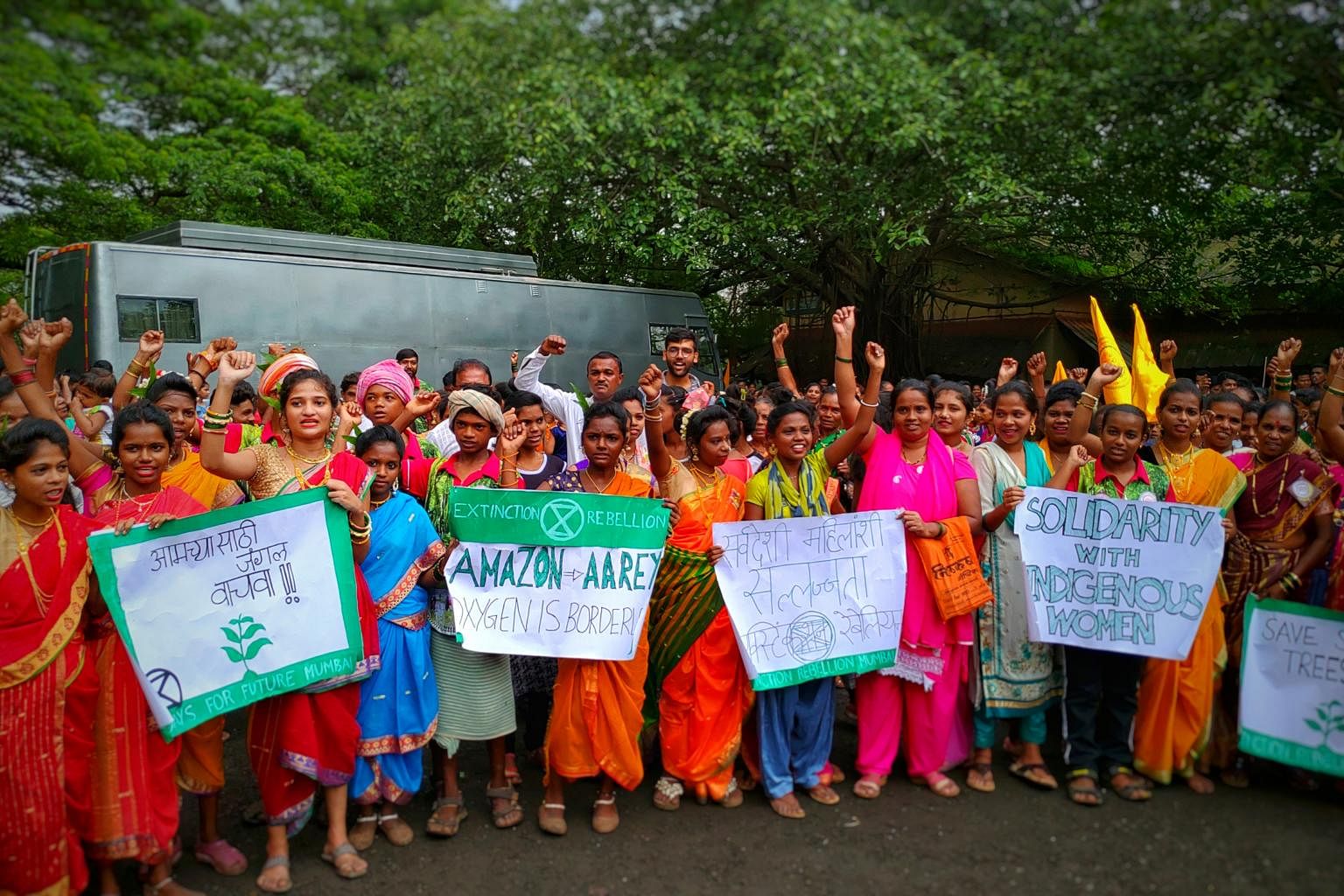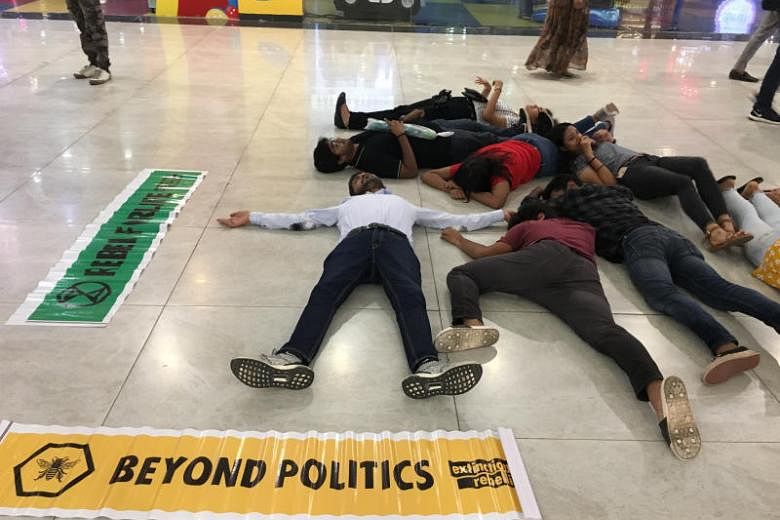BANGALORE - Software professional Rajani Rao became an environmental activist because she was tired of waiting for someone else to fix the world for her children.
Ms Rao, who lives in Bangalore, realised during a career break to raise her twins that they were entirely shielded from the natural world - in school and at home.
"Where is my own sense of responsibility?" the 44-year-old asked herself when her children became teenagers. The question made her volunteer in her neighbourhood: promoting recycling, challenging noise pollution by nightclubs, and planting trees.
Last November, Ms Rao saw a photo of hundreds of people blocking major bridges in London. They were volunteers with Extinction Rebellion (XR), a movement that creates awareness about climate change through dramatic protests.
XR had an India branch, but when she asked about a Bangalore chapter, a coordinator asked her if she herself could start one.
"I have no experience in setting up an association or company, I haven't been to major rallies, or questioned government, but this felt right," she said.
In May, she joined over 400 volunteers stood outside Bangalore's Town Hall, protesting against climate inaction. With her, uniformed school girls held a poster with a hand-drawn earth on fire that read: "I want you to panic."

A GLOBAL CLIMATE MOVEMENT
The Earth has warmed by about 1 deg C since the widespread use of fossil fuels like coal and oil in the 1800s. Since 1990, global greenhouse gas emissions have gone up by 60 per cent, leading to devastating hurricanes in the United States, droughts and heatwaves in Asia and forest fires in Australia and California.
In other words, most of the damage has been done after the world had scientific evidence about climate change.
People tend to imagine that global warming will affect glaciers and islands many years from now. But a 3 degree rise - which is what emissions at today's rate will lead to - will render much of Asia and Africa unliveable.
XR activists say there is no time left for denial or incremental steps. Since launching in Britain in July 2018, they have used dramatic protests to push the climate crisis up the political and media agenda.
They chain their necks to the fences of known climate-offending corporates, stage "die-ins" in public buildings, and take over major public squares. Their non-violent but disruptive activism delayed traffic in July in central London and four other cities in Britain.
Critics wonder if the inconvenience caused by obstinate civil disobedience is worth it, or if it is just "self-indulgent therapy". But politicians and the media, at least in Europe, have not been able to ignore XR's message.
In April, XR protesters blocked the main streets and bridges of London to pressure the government to sign on to a radical overhaul of the energy economy to reach zero-emissions.
About 1,000 protesters were arrested, but in May, parliamentarians approved a motion to declare a climate emergency, one of XR's demands, making Britain the first country to do so.
XR's deadline for action is a terrifyingly close 2025, five years sooner than the year an influential 2018 United Nations report sets for humans to nearly halve carbon pollution to keep the rise in global temperatures down to 1.5 deg C, and give the next generation a fighting chance at survival.
Mr Howard Rees, a London-based XR coordinator said many older ecological movements have succeeded in stopping destruction by individual projects, but overall, emissions have substantially worsened. He added: "XR is humbly following in the footsteps of older movements but our approach is to demand dramatic change in overall outlook."
XR's directness and impatience attracts newcomers and energises cynical old hands, but is it impractical to set so radical a task?
"Negotiating for a little change has failed, so why not ask for the whole world?" Mr Rees replied.
In under a year, he estimates, XR has expanded to about 120,000 volunteers across 63 countries.
REBELS IN INDIA
XR India, like most of its global chapters, began with one exasperated individual.
Indian-born Chittranjan Dubey, a software consultant, was in Bristol, Britain, when XR kicked off there.

"I accompanied some friends to one of XR's evening meetings, expecting anger and frustration, but the energy was so positive," said Mr Dubey, who was earlier part of India Against Corruption, a movement of largely first-time, mostly middle-class Indians who in 2011-12 demanded the passage of an anti-corruption law.
"In XR, I thought - these people are just like me."
He attended every meeting for 10 months. Last November, he joined the thousands blocking traffic on the Waterloo bridge in central London.
With help from organisers in London, Mr Dubey set up a Facebook group called Extinction Rebellion India, asking interested volunteers to write to him. Many did.
"Most of them asked if XR existed in their city or town - I would say, no, you start it!" said Mr Dubey. XR India now has six city groups: Bangalore, Mumbai, Hyderabad, Chennai, Pune and Delhi.
XR's organisers say they are non-hierarchical and have no designations, but volunteer for specific roles.
"The biggest challenge in XR is convincing people that they don't need someone to report to," said Mr Shikhar Agarwal, a 22-year-old who started an XR chapter in Mumbai.

An environment studies undergraduate at Yale-NUS College in Singapore, he said reading the latest news of accelerating environmental crisis and growing inequality in the world led him to have "climate depression".
On a trip to Amsterdam last year, Mr Agarwal encountered XR's mobilisation strategy, influenced by the work of Harvard University political scientist Erica Chenoweth, who found that an opposition movement can succeed when at least 3.5 per cent of a population publicly participates in non-violent resistance.
"This action-oriented plan and the hard 2025 deadline gave me relief and purpose," Mr Agarwal said. "Everyone on earth didn't have to join, just some people did."
MOVEMENT OF MOVEMENTS
In some ways, XR has come home.
India is the birthplace not only of Mahatma Gandhi's non-violent civil disobedience, but also of "tree hugging", a concept pioneered by the 1970s Chipko movement to physically block deforestation.

For decades, farmers have marched barefoot to draw attention to drought, activists have fasted to oppose river-choking dams, and tribal communities have rallied to prevent sacred mountains being blasted for minerals.
India is home to most of the world's people vulnerable to rising sea levels, heatwaves and unpredictable rains. But it is also the world's third-largest carbon emitter. Ms Rao said XR connected the impacts of different causes, and focused on the cumulative devastation of decades of bad ecological choices.
Mobilising people in cities can be challenging. So XR India's strategy has been to encourage volunteers to target local concerns: air pollution in Delhi, water crisis in Chennai, corporate injustice in Bhopal, lake encroachment in Bangalore.
To build common cause with other communities, XR India recently joined the Narmada Bachao Andolan, one of the country's oldest grassroots movements, to demand rehabilitation for tens of thousands facing submergence by the Sardar Sarovar dam near Gujarat in India's west.
"We fight together. We survive together," a press release at their Delhi protest said. XR's Mumbai volunteers have joined protests against the destruction of acres of the city's precious forest land for a metro rail parking shed.
Climate action in India can seem a conundrum: The country has a growing vegan movement but also many livestock-rearing communities; small farmers hit by chronic drought are digging deeper borewells, depleting groundwater further; and major cities are flooding nearly every year but also building concrete infrastructure to support growing populations.
Indian Prime Minister Narendra Modi has championed an international solar energy alliance and often advocates green development. But simultaneously, his government has overseen a dangerous weakening of environmental protections.
Renewable energy has expanded by 47 per cent, but coal-based energy has also expanded by 18 per cent and is expected to double by 2040.
The contradictions are many, but one prediction is clear. According to a 2018 study tallying long-term effects across countries, India will bear by far the highest social cost of carbon, which means it will suffer the most economic damage.
While discussing these facts at home earlier this year, Mr Agarwal's father asked him why India had to give up on development when it was the West that had done all the damage.
He replied: "We can say the West did it and continue the same way. Or we can accept that we're vulnerable and demand change."
XR India is now planning an all-India protest on Oct 7. They hope the non-cynics will turn up.
This story is published as part of The Straits Times' partnership with Covering Climate Now, a global collaboration of more than 250 news outlets to strengthen coverage of the climate story.


